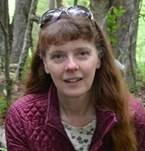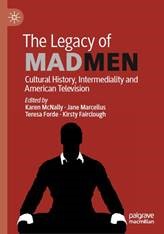Scholar Spotlight
Jane Marcellus

Professor and feminist media historian Jane Marcellus earned her Ph.D. in Communication and Society (Media Studies) at the University of Oregon, where her research examined representation of employed women in early twentieth-century magazines. She also holds a bachelor's in English from Wesleyan University, a master's in journalism from Medill at Northwestern, and a second master's in English from the University of Arizona. Dr. Marcellus's classes include media history, feature writing, and cultural studies theory. She has explored early-20th-century gender representation in print media, newspaper coverage of the women’s suffrage moment, and the popular TV series Mad Men.
Dr. Marcellus is an editor of the new book The Legacy of Mad Men: Cultural History, Intermediality and American Television, published in December 2019. Professor Jeremy Butler of the University of Alabama says, “The Legacy of Mad Men adds significant new perspectives to the legacy of Mad Men scholarship. The authors apply theoretical perspectives that have been understudied in previous Mad Men work, chart new connections with previous media, and examine overlooked aspects of Men Men’s sound design. A concluding chapter insightfully considers how the election of Donald Trump has signaled a resurgence in the sexism, antisemitism, and racism critiqued in Mad Men.”
She talks to Dean Keel about her new book, passion for research and advice for writers and editors.

How did you become interested in your area of research? Do you remember what first captured your curiosity and passion?
My area of research is a blend of media representation of employed women and media history. I was drawn to history because I was blessed with old parents—my mom was 38 and my dad 57 when I was born, so growing up I heard about the past a lot. I felt entranced by their stories of a world I wasn’t a part of. That longing to understand their world led to my research agenda. I started writing about employed women as a doctoral student at the University of Oregon. I realized there was a discrepancy between what I read about women with jobs and what my mother told me. There is (or was) kind of a historical myth that women almost never had jobs before World War II, but I knew my mom had left her parents’ farm to go to secretarial school during the Depression, and that she was named “Runner Up for Man of the Year” by a company she ran. So my parents didn’t match what media presented as “normal.” I decided to see what popular magazines had to say about women with jobs before World War II. It turned out they said a lot! Better yet, no one had written much about it.
You have been studying the AMC TV show Mad Men for years and organized a very successful conference at MTSU in 2016. What was it about the show that interests you? As a feminist media scholar, what are a few of your perspectives about the show?
Studying Mad Men started out as a diversion. I liked the show, so I mentioned to three friends who also went to AEJMC that we should do a panel on it. That eventually led to the first Mad Men book I was part of, Mad Men and Working Women: Feminist Perspectives on Historical Power, Resistance, and Otherness (2014). Around that time, I met David Lavery. He was in the English department, but his daughter, Sarah, had been one of my journalism students. He had organized a conference on Buffy the Vampire Slayer and loved Mad Men, too. As a TV scholar, he also knew Kirsty Fairclough and our other co-organizer, Michael Goddard at Salford University in the UK, so we all got together, thanks to Skype. When we put out the call for papers, we didn’t know if anyone would come. It turned out that we had people come to Murfreesboro to talk about Mad Men from as far away as New Zealand and South Africa. Mad Men functions on a deeper level than most television. The characters are complex and layered, and their story arcs intersect in ways that allow them to struggle with issues on an internal and external level, like most of us are doing most of the time. It’s like reading one of those fat 19th-century novels, Anna Karenina or something. In fact, watching the show, I kept wanting to hold Mad Men, the way I would a book. I’ve watched it a bunch of times, and every time, it still surprises me, even in places where I have memorized the dialogue. As for women, there are types of women on the show—the housewife/mom, the young working girl, the sexualized secretary, etc.—but they are not reduced to stereotypes. We see from inside their points of view, and we see them struggle and change. That’s really rare on TV. Mad Men shows us, for example, what it has felt like for women to be sexually harassed and to get along in a world where male privilege is taken for granted. We’re there with them, and I think that has been eye-opening and maybe paved the way for movies such as Bombshell to be made.
How did the book happen? What was your goal for the book?
We had talked about a book even before the conference. There are many books on Mad Men, but most were published before it ended, so we wanted a scholarly book that included the whole series, including the finale. We also just wanted to share all this cool work from the conference. Very sadly and unexpectedly, David Lavery died in August 2016, three months after the conference. I learned this on Facebook walking out of class one day. Kirsty, Michael, and I went ahead with it, inviting abstracts from everyone who submitted to the conference and then picking the ones we thought were best. Then Michael got a new job and had to withdraw. Luckily, two women from the conference, Karen McNulty and Teresa Forde, volunteered to join Kirsty and me. The four of us working together made it less daunting. At that point we had a half-written proposal and some abstracts, so the infusion of new energy really helped.
What are some things you learned during the creation of this book?
I had never worked with authors who were developing chapters, so that was new. I really like working with grad students to develop their theses, so it was a little like that but on a higher level and for publication. I enjoyed that role. I learned to copy edit in British English! As the only American, I was in the minority, and our publisher (Palgrave Macmillan) is based in London. It still looks weird to me to put commas and periods outside quote marks, but I got used to it. Also, they seem to use the letter “z” a lot less. With both Mad Men books, I learned to collaborate. I’ve mostly written on my own, but collaborating was fun. It’s good to have a sense of community with writing.
You co-authored the book with Salford University Professor Kirsty Fairclough, who is a favorite among many faculty in the college. She has visited campus several times and collaborated on several projects, including the symposium on the life and music of Prince. What was your experience like working with her? Did she bring a different perspective because she is based in the U.K.?
Kirsty has a keen ear for what’s popular in the here and now, whereas I’m very past-oriented. She also knew more about how the show was received over there, and she’s fun. Since all the other editors were British, we talked about the show more as an international phenomenon rather than just an American one. I think that’s a strength of the book.
What are you working on now? What shows/media outlets are of particular interest?
In a parallel research universe, I have been doing work on women’s suffrage. In 2010 I published an article in Journalism & Mass Communication Quarterly about how the Nashville press covered the suffrage debate in the summer of 1920. Last year I was invited to contribute a chapter to a forthcoming book, Front Pages, Front Lines: Media and the Fight for Women’s Suffrage, which some other feminist media historians were editing. Since Tennessee was the last state to ratify, they really wanted a Tennessee chapter. Like the earlier paper, I looked at the Tennessean and the Banner, but went back to around the turn of the 20th century and looked at race and masculinity. I’m working with Deborah Fisher to bring one of the editors, Brooke Kroeger, and another author, Teri Finneman, to campus on March 30 for a Seigenthaler Chair event. I also have a chapter in a book called Critical Perspectives on Wives, which updates some older work. Right now I’m revising a conferenced but unpublished paper on the press and Section 213 of the 1932 Federal Economy Act, which pushed married women out of jobs during the Depression. It sounds boring but the law was the subject of a fictionalized newspaper serial, dubbed “thrilling,” in 1936. I also dabble in literary non-fiction. My work has been listed as “Notable” in the Best American Essays for 2018 and 2019.
As an editor, what advice do you have for faculty who are writing essays for books such as this?
I think every edited collection has a vision, which the editors have convinced a publisher is worthwhile. So you have to work with that, thinking about how what you have to say could be part of that, and also being on the lookout for editors who may be looking for what you have to offer. Also, be patient. Books can take a long time, for various reasons.
As a longtime author, what advice do you have for new faculty who are embarking on academic research and writing?
Follow your own curiosity, rather than what you think someone else wants you to write. You have to be practical, working within what’s publishable, but just decide that whatever you have to say, the world probably needs to hear it.
Do you have any other tips about research, writing, time/data management, or anything else?
Figure out when you work best, and commit to showing up and getting something done. Also, get to know other people at other universities, because cross-pollination is important and will help you get published. Things just go better if you find your tribe.


